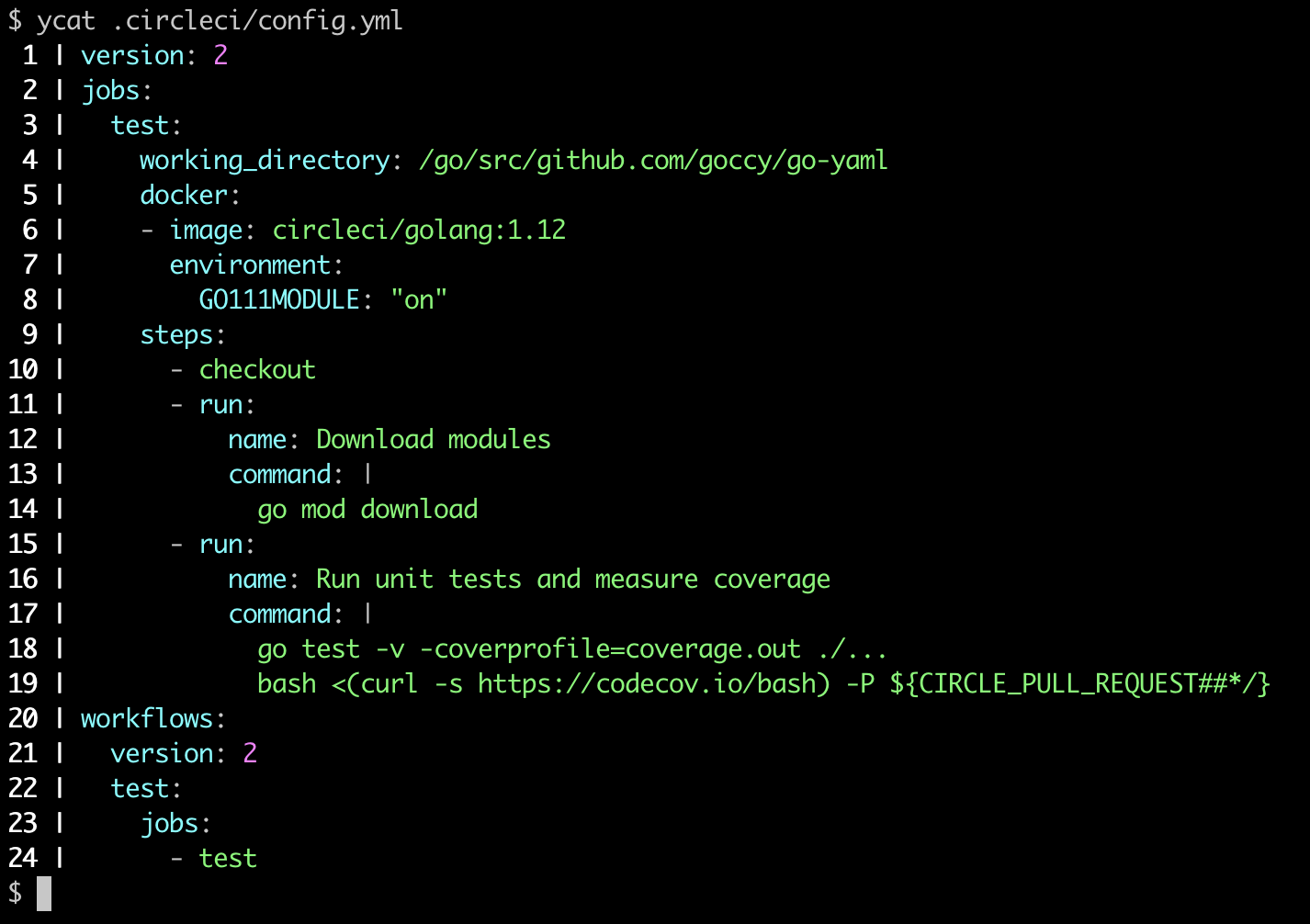 Documentation
¶
Documentation
¶
Index ¶
- Constants
- func FormatError(e error, colored, inclSource bool) string
- func Marshal(v interface{}) ([]byte, error)
- func Unmarshal(data []byte, v interface{}) error
- type BytesMarshaler
- type BytesUnmarshaler
- type DecodeOption
- type Decoder
- type EncodeOption
- type Encoder
- type FieldError
- type InterfaceMarshaler
- type InterfaceUnmarshaler
- type IsZeroer
- type MapItem
- type MapSlice
- type StructField
- type StructFieldMap
- type StructValidator
Examples ¶
Constants ¶
const (
// DefaultIndentSpaces default number of space for indent
DefaultIndentSpaces = 2
)
const (
// StructTagName tag keyword for Marshal/Unmarshal
StructTagName = "yaml"
)
Variables ¶
This section is empty.
Functions ¶
func FormatError ¶
FormatError is a utility function that takes advantage of the metadata stored in the errors returned by this package's parser.
If the second argument `colored` is true, the error message is colorized. If the third argument `inclSource` is true, the error message will contain snippets of the YAML source that was used.
func Marshal ¶
Marshal serializes the value provided into a YAML document. The structure of the generated document will reflect the structure of the value itself. Maps and pointers (to struct, string, int, etc) are accepted as the in value.
Struct fields are only marshalled if they are exported (have an upper case first letter), and are marshalled using the field name lowercased as the default key. Custom keys may be defined via the "yaml" name in the field tag: the content preceding the first comma is used as the key, and the following comma-separated options are used to tweak the marshalling process. Conflicting names result in a runtime error.
The field tag format accepted is:
`(...) yaml:"[<key>][,<flag1>[,<flag2>]]" (...)`
The following flags are currently supported:
omitempty Only include the field if it's not set to the zero
value for the type or to empty slices or maps.
Zero valued structs will be omitted if all their public
fields are zero, unless they implement an IsZero
method (see the IsZeroer interface type), in which
case the field will be included if that method returns true.
flow Marshal using a flow style (useful for structs,
sequences and maps).
inline Inline the field, which must be a struct or a map,
causing all of its fields or keys to be processed as if
they were part of the outer struct. For maps, keys must
not conflict with the yaml keys of other struct fields.
anchor Marshal with anchor. If want to define anchor name explicitly, use anchor=name style.
Otherwise, if used 'anchor' name only, used the field name lowercased as the anchor name
alias Marshal with alias. If want to define alias name explicitly, use alias=name style.
Otherwise, If omitted alias name and the field type is pointer type,
assigned anchor name automatically from same pointer address.
In addition, if the key is "-", the field is ignored.
For example:
type T struct {
F int `yaml:"a,omitempty"`
B int
}
yaml.Marshal(&T{B: 2}) // Returns "b: 2\n"
yaml.Marshal(&T{F: 1}} // Returns "a: 1\nb: 0\n"
func Unmarshal ¶
Unmarshal decodes the first document found within the in byte slice and assigns decoded values into the out value.
Struct fields are only unmarshalled if they are exported (have an upper case first letter), and are unmarshalled using the field name lowercased as the default key. Custom keys may be defined via the "yaml" name in the field tag: the content preceding the first comma is used as the key, and the following comma-separated options are used to tweak the marshalling process (see Marshal). Conflicting names result in a runtime error.
For example:
type T struct {
F int `yaml:"a,omitempty"`
B int
}
var t T
yaml.Unmarshal([]byte("a: 1\nb: 2"), &t)
See the documentation of Marshal for the format of tags and a list of supported tag options.
Types ¶
type BytesMarshaler ¶
BytesMarshaler interface may be implemented by types to customize their behavior when being marshaled into a YAML document. The returned value is marshaled in place of the original value implementing Marshaler.
If an error is returned by MarshalYAML, the marshaling procedure stops and returns with the provided error.
type BytesUnmarshaler ¶
BytesUnmarshaler interface may be implemented by types to customize their behavior when being unmarshaled from a YAML document.
type DecodeOption ¶
DecodeOption functional option type for Decoder
func DisallowUnknownField ¶ added in v1.1.3
func DisallowUnknownField() DecodeOption
DisallowUnknownField causes the Decoder to return an error when the destination is a struct and the input contains object keys which do not match any non-ignored, exported fields in the destination.
func RecursiveDir ¶
func RecursiveDir(isRecursive bool) DecodeOption
RecursiveDir search yaml file recursively from passed dirs by ReferenceDirs option
func ReferenceDirs ¶
func ReferenceDirs(dirs ...string) DecodeOption
ReferenceDirs pass to Decoder that reference to anchor defined by files under the passed dirs
func ReferenceFiles ¶
func ReferenceFiles(files ...string) DecodeOption
ReferenceFiles pass to Decoder that reference to anchor defined by passed files
func ReferenceReaders ¶
func ReferenceReaders(readers ...io.Reader) DecodeOption
ReferenceReaders pass to Decoder that reference to anchor defined by passed readers
func Validator ¶
func Validator(v StructValidator) DecodeOption
Validator set StructValidator instance to Decoder
type Decoder ¶
type Decoder struct {
// contains filtered or unexported fields
}
Decoder reads and decodes YAML values from an input stream.
func NewDecoder ¶
func NewDecoder(r io.Reader, opts ...DecodeOption) *Decoder
NewDecoder returns a new decoder that reads from r.
type EncodeOption ¶
EncodeOption functional option type for Encoder
type Encoder ¶
type Encoder struct {
// contains filtered or unexported fields
}
Encoder writes YAML values to an output stream.
func NewEncoder ¶
func NewEncoder(w io.Writer, opts ...EncodeOption) *Encoder
NewEncoder returns a new encoder that writes to w. The Encoder should be closed after use to flush all data to w.
func (*Encoder) Close ¶
Close closes the encoder by writing any remaining data. It does not write a stream terminating string "...".
func (*Encoder) Encode ¶
Encode writes the YAML encoding of v to the stream. If multiple items are encoded to the stream, the second and subsequent document will be preceded with a "---" document separator, but the first will not.
See the documentation for Marshal for details about the conversion of Go values to YAML.
type FieldError ¶
type FieldError interface {
StructField() string
}
FieldError need to implement StructField method only ( see https://godoc.org/gopkg.in/go-playground/validator.v9#FieldError )
type InterfaceMarshaler ¶
type InterfaceMarshaler interface {
MarshalYAML() (interface{}, error)
}
InterfaceMarshaler interface has MarshalYAML compatible with github.com/go-yaml/yaml package.
type InterfaceUnmarshaler ¶
InterfaceUnmarshaler interface has UnmarshalYAML compatible with github.com/go-yaml/yaml package.
type IsZeroer ¶
type IsZeroer interface {
IsZero() bool
}
IsZeroer is used to check whether an object is zero to determine whether it should be omitted when marshaling with the omitempty flag. One notable implementation is time.Time.
type MapSlice ¶
type MapSlice []MapItem
MapSlice encodes and decodes as a YAML map. The order of keys is preserved when encoding and decoding.
type StructField ¶
type StructField struct {
FieldName string
RenderName string
AnchorName string
AliasName string
IsAutoAnchor bool
IsAutoAlias bool
IsOmitEmpty bool
IsFlow bool
IsInline bool
}
StructField information for each the field in structure
type StructFieldMap ¶
type StructFieldMap map[string]*StructField
type StructValidator ¶
type StructValidator interface {
Struct(interface{}) error
}
StructValidator need to implement Struct method only ( see https://godoc.org/gopkg.in/go-playground/validator.v9#Validate.Struct )
Example ¶
package main
import (
"fmt"
"strings"
"github.com/goccy/go-yaml"
"gopkg.in/go-playground/validator.v9"
)
type Person struct {
Name string `validate:"required"`
Age int `validate:"gte=0,lt=120"`
}
func main() {
yml := `---
- name: john
age: 20
- name: tom
age: -1
- name: ken
age: 10
`
validate := validator.New()
dec := yaml.NewDecoder(
strings.NewReader(yml),
yaml.Validator(validate),
)
var v []*Person
err := dec.Decode(&v)
if err == nil {
panic("expected error")
}
fmt.Printf("%v", err)
}
Output: [5:8] Key: 'Person.Age' Error:Field validation for 'Age' failed on the 'gte' tag 1 | --- 2 | - name: john 3 | age: 20 4 | - name: tom > 5 | age: -1 ^ 6 | - name: ken 7 | age: 10


